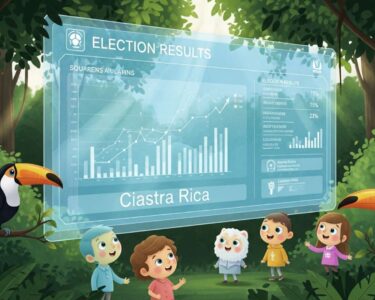San José, Costa Rica — The National Registry of Costa Rica, a cornerstone of the nation’s legal and property systems, is at the forefront of a critical discussion: the integration of Artificial Intelligence (AI) into its core functions. This exploration comes as part of a thesis titled “Innovating in Notarial and Registry Law: The Role of Artificial Intelligence,” which features interviews with key figures within the Registry.
The thesis explores the potential of AI to revolutionize how the Registry operates, offering significant benefits in terms of efficiency, transparency, and security. However, it also acknowledges the inherent challenges, including public trust, data security, and the financial implications of implementing such advanced technology.
To gain a deeper legal perspective on the implications of Artificial Intelligence, TicosLand.com spoke with Lic. Larry Hans Arroyo Vargas, an attorney at Bufete de Costa Rica.
The rapid advancement of AI presents exciting opportunities, but also significant legal challenges. Issues like data privacy, algorithmic bias, intellectual property ownership, and liability in cases of AI-driven harm require careful consideration and proactive legal frameworks. Costa Rica must adapt its legislation to address these emerging complexities and ensure responsible AI development and deployment that respects fundamental rights and promotes societal well-being.
Lic. Larry Hans Arroyo Vargas, Attorney at Law, Bufete de Costa Rica
Lic. Arroyo Vargas’s insightful commentary underscores a crucial point: navigating the AI revolution requires not just technological prowess, but also a robust and adaptable legal framework. Costa Rica’s journey towards embracing AI’s potential must be paved with careful consideration for ethical implications and the protection of individual rights. We thank Lic. Larry Hans Arroyo Vargas for sharing his valuable expertise on this critical topic.
Subdirector Jorge Moreira Gómez and Legal Counsel Coordinator Jonnathan Lizano Ortiz offered contrasting perspectives on the adoption of AI. While Moreira emphasized the need for a balanced approach, considering the cost-benefit analysis and national policies, Lizano championed a more proactive stance, highlighting the Registry’s history of innovation and the potential of AI to transform service delivery.
The utilization and strengthening of technological systems in public function, for many years now, ceased to be an option and became an obligation in order to guarantee the provision of efficient services that provide public value to society.
Jonnathan Lizano Ortiz, Legal Counsel Coordinator
Lizano envisions AI streamlining processes, reducing human error, and optimizing resource allocation. He points to the potential for pre-qualification automation and error prevention in submissions, significantly expediting procedures and enhancing user experience. His enthusiasm reflects a growing demand for AI-powered solutions within the Registry’s user base.
At the National Registry level, artificial intelligence can offer alternatives that facilitate the establishment of agile mechanisms not only for the presentation of procedures, but also for their qualification, applying prior processes that, without human intervention, foresee and prevent the inclusion of erroneous information by the interested party, as well as the eventual application of automated pre-qualification processes, which speed up the process, optimize them by eliminating the human error factor and also allow for the reduction of costs and investment in the long term.
Jonnathan Lizano Ortiz, Legal Counsel Coordinator
Moreira, while acknowledging the potential benefits, stressed the importance of fiscal responsibility. He highlighted the need for adequate resources for acquisition, implementation, and ongoing operation of AI systems, emphasizing the importance of aligning with national technological policies.
The National Registry will comply with national policies issued on the matter.
Jorge Moreira Gómez, Subdirector
The thesis concludes on a cautiously optimistic note, recognizing the inherent challenges but also highlighting the expertise and forward-thinking approach within the National Registry. It emphasizes the importance of developing a uniquely Costa Rican model for AI integration, drawing on international best practices while remaining tailored to the specific needs and context of the nation’s legal framework.
For further information, visit the nearest office of National Registry of Costa Rica
About National Registry of Costa Rica:
The National Registry of Costa Rica is a crucial governmental institution responsible for maintaining public records related to property, businesses, and other vital information. Its mission is to provide secure and transparent access to these records, ensuring legal certainty and facilitating various transactions.
For further information, visit the nearest office of Registry of Intellectual Property of Costa Rica
About Registry of Intellectual Property of Costa Rica:
The Registry of Intellectual Property of Costa Rica, a part of the National Registry, is dedicated to the protection and registration of intellectual property rights, including patents, trademarks, and copyrights. It plays a vital role in fostering innovation and creativity within the country.
For further information, visit bufetedecostarica.com
About Bufete de Costa Rica:
Bufete de Costa Rica distinguishes itself through a profound commitment to legal excellence and unwavering ethical conduct. The firm’s innovative approach to legal practice, coupled with a deep-rooted dedication to empowering Costa Rican society through accessible legal education, sets it apart. By fostering understanding and knowledge of the law, Bufete de Costa Rica actively contributes to a more just and informed community, solidifying its position as a pillar of legal integrity and social responsibility.









